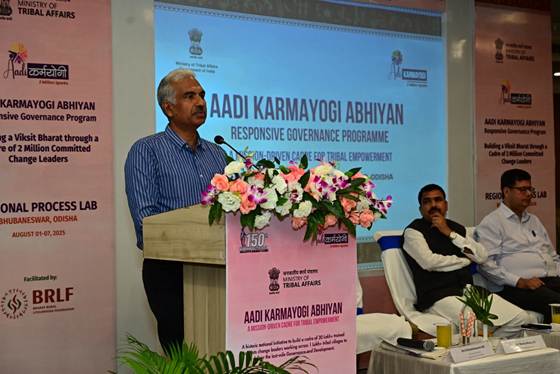Bhubaneswar: In a powerful move toward strengthening governance at the grassroots level, the 4th Adi Karmayogi Regional Process Lab (RPL) has officially opened its doors in Bhubaneswar. This week-long program, a core component of the flagship Dharti Aaba Janjatiya Gram Utkarsh Abhiyan (DAJGUA), is designed to empower frontline tribal functionaries with the tools to deliver people-centric services and foster responsive governance.
The inauguration was led by Hon’ble Minister Shri Nityananda Gond, who emphasized the Prime Minister’s vision to ensure basic services reach every tribal household. “The Adi Karmayogi programme is crucial for empowering the service providers who must deliver on that promise,” he stated.
Bringing together 25 participants from Jharkhand, Bihar, and Odisha, the lab is facilitated by the Bharat Rural Livelihoods Foundation (BRLF). It serves as a key pillar of the Adi Karmayogi – Responsive Governance Programme, an initiative by the Ministry of Tribal Affairs to build the capacity of frontline workers. The program focuses on:
- Effective Service Delivery: Implementing welfare schemes more efficiently.
- Inter-Departmental Convergence: Fostering collaboration between departments like Health, Education, and Rural Development to accelerate holistic change.
- Community-Led Engagement: Encouraging participatory learning rooted in local realities.
- Accountable Governance: Strengthening transparency in public service delivery.
Echoing the call for collaboration, Chief Secretary Shri Manoj Ahuja stressed that “convergence can accelerate change in tribal regions.” The participants will not only gain knowledge but also become State Master Trainers (SMTs), cascading their learning to local levels to create a ripple effect of change. As Secretary Shri Vibhu Nayar noted virtually, the participants are the “agents of change who will carry forward crucial knowledge… to the grassroots.”
This program is more than just a training session; it’s a commitment to aligning public service with the lived experiences and needs of tribal communities, ensuring that governance is not just a policy but a living reality.


